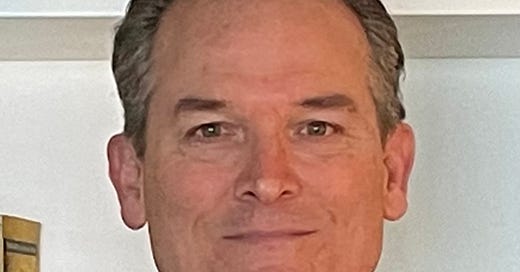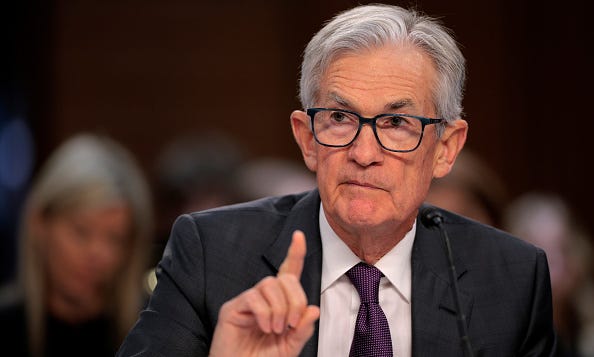Talking SEC Enforcement Overreach; Banks Outflank Powell on Vice Chair Job; Inside the CFPB's Dismantling
Capitol Account: Free Weekly Edition
There was a whole lot of good news for financial firms this week. The acting leaders of the SEC, FDIC and OCC all stopped by the Institute of International Bankers’ annual Washington conference to lay out their plans for revising rules and reshaping oversight. They all seemed to be singing from the same hymnbook. The Fed’s general counsel also made a rare appearance at the event and signaled that the central bank won’t buck the Trump administration’s deregulatory agenda.
Meanwhile, it emerged that the president plans to nominate banks’ preferred pick to be the Fed’s vice chair for supervision. The decision, sources told us, came after a vigorous behind-the-scenes lobbying battle to thwart Chairman Jerome Powell, who wanted to keep the post vacant. The industry resisted — very carefully.
We also took a step back and looked at the attempted shuttering of the CFPB, a story pieced together from court documents and two days of tense testimony in a case filed by the agency’s employees union. The D.C. federal judge presiding over the matter is confronting complex legal questions as she tries to figure out whether to block the acting director’s mass firings. For our Friday interview, we spoke with a former SEC trial attorney who runs a non-profit dedicated to stopping enforcement “overreach.”
Thanks for reading our digest of articles published this week. To stay on top of the news, click the button below and subscribe to the daily newsletter.
Friday Q and A: The Republican-led SEC is doubling down on its mission to promote capital formation and provide more access to the markets for companies and investors. On the enforcement side, that has meant shifting resources, dropping prominent cases targeting crypto firms and a lot of talk about ending “regulation by enforcement.”
This week we sat down with a former trial lawyer at the commission who argues that much more needs to be done to make the effort stick. Nick Morgan’s Investor Choice Advocates Network is looking to set a “legal bulwark against overreach.” The non-profit works with law firms to provide pro bono legal representation for people facing SEC charges for offenses that don’t involve fraud – but could cost millions of dollars to fight.
ICAN also files amicus briefs in cases that could impact the enforcement program. One of its best known filings was in the Supreme Court case that curbed the SEC’s use of administrative courts. It was joined by Elon Musk and Mark Cuban, both of whom have had high-profile clashes with the agency.
Morgan says that regulation by enforcement will never go away entirely, and stresses that the real way to make lasting change is to establish legal precedents that keep the SEC’s authority in bounds. Read on to hear about his litigation strategies and why he wishes that some of those cases against digital asset companies had gone forward. What follows is our (lightly edited and condensed) conversation.
Capitol Account: Tell us about your career?
Nick Morgan: I was a senior trial counsel in the [SEC’s] Los Angeles regional office…I was there for seven years, and enjoyed it very much…The assistant director I came up under was very fond of going after Ponzi schemes. We did one after another…After the SEC, I was in private practice for 18 years at big law firms, primarily DLA Piper and Paul Hastings.
CA: What led you to start ICAN?
NM: At first it was a sort of a side project at Paul Hastings, [with] my partner, Tom Zaccaro. We met at the SEC and have been friends and practiced together since…We created the non-profit for a number of reasons, but one of them was so that we would have a way to inform courts about a perspective we didn’t think was being shared. We wanted to file amicus briefs.
CA: On what kind of topics?
NM: Often it was this sort of investor choice issue, where you've got a defendant arguing, `I didn’t do it.’ And you’ve got the SEC saying, `There’s a legal violation here.’ But no one is saying: Even if the defendant did it, if the SEC gets its way, the impact – particularly over a long period of time – will end up restricting investor choices. No one was in a position to make that argument.
CA: How did ICAN move to representing actual defendants?
NM: We frequently would get approached by people: `I just got an SEC subpoena and I need to respond. Can I engage you?’ We’d say yes – and then we’d tell them our price tag.
CA: Big law firms aren’t cheap.
NM: It wasn’t just being at a law firm that charged high hourly rates. It’s also a function of the length of SEC matters, even at more modest rates. It’s very expensive [to have] a lawyer start during the exam process, go through the investigation process and then through trial. You’re talking millions of dollars.
CA: So the people you represent aren’t necessarily well-heeled executives?
NM: They tend to be individuals who…don’t have insurance coverage or they’re not being indemnified by their current or former employer. They’re paying out of their own pocket…We looked around and thought, who is representing these people? And the answer is, nobody. These SEC matters are civil, there is no right to a public defender, for example, that you might be entitled to in a criminal matter.
CA: Part of ICAN’s mission is to fight against `SEC overreach.’ That’s a term that was used often to describe many of Gary Gensler’s regulations. Is it different in the enforcement context?
NM: You can have SEC overreach like in the last administration, [where] there are rules being promulgated that would extend the SEC’s authority beyond what’s authorized by statute or the Constitution. That is largely addressed by industry groups. The [enforcement] overreach happens…incrementally on a case-by-case basis, as a byproduct of the fact that people can’t afford counsel.
CA: How so?
NM: Because the SEC settles with everyone. It accumulates…a body of what it views to be precedent, at least internally. It’s not technically precedent from an appellate court decision perspective. But that means over time you get a very pro-SEC landscape…You’ve got no one pushing back.
CA: What about financial firms? They have plenty of money, but they don’t often fight the SEC in court either.
NM: These are regulated industries, like broker dealers and investment advisers. Do you want to be in the business of litigating with the SEC, your primary regulator? Is that a good idea when the next day their exam staff is going to be [at the firm] looking at new issues? It doesn’t take a retaliatory mindset at the regulator, which I don’t think exists, to be concerned about that.
CA: What’s the broader point?
NM: At a minimum, we should all want to see a judge weigh in on some of these issues to test the SEC’s theory – particularly where you've got an individual…whose career and livelihood will be ruined…(Friday)
Click here to subscribe and read the rest of the interview.
Thanks for reading. Follow us on X @CapitolAccount and on LinkedIn by clicking here. We’re always looking for stories, so if you have any suggestions on what we should cover (or comments about Capitol Account), shoot us a note. Rob can be reached at: rschmidt@capitolaccountdc.com and Ryan at rtracy@capitolaccountdc.com. If somebody forwarded this to you and you’d like to subscribe, click on the button below. Please email for information on our special rates for government employees, academics and groups: subscriptions@capitolaccountdc.com.
Fed Fight: Michelle Bowman’s expected ascension to the Fed’s top regulatory job is a big boon to banks – and it was no accident. The industry has spent the past weeks frenetically lobbying the Trump administration and congressional Republicans to ensure that the vice chair for supervision post was filled immediately.
The campaign, sources say, was all hands on deck – leading trade groups, individual firms and top executives pitched in. Banking associations from all 50 states were persuaded to write to the Treasury secretary touting Bowman’s credentials. Top Republican lawmakers in the House and Senate followed up with their own letter, demanding a “strong leader” be installed “as soon as possible.” (Given the timing and the other options available, Bowman was the implied choice.)
The entreaty came after a February meeting that consumer bank CEOs had with Chairman Tim Scott and other GOP members of the Senate Banking Committee where the executives underscored the need for a vice chair. JPMorgan’s Jamie Dimon, one source says, remarked that Bowman should be in the position – yesterday.
On the media side, Larry Kudlow was encouraged to have dinner with Bowman, sources say. The former White House economic adviser in Donald Trump’s first term became an important backer, writing on Fox Business’ website earlier this month that she was likely to get the nod, and “be a welcome relief from Jay Powell's woke policies.” The Wall Street Journal opinion page also compared Bowman favorably to the Fed chairman in an editorial this weekend that highlighted his support for Biden-era plans on swipe fees and climate change guidance. It urged the president not to let the appointment “go to waste.”
And in an interview with the president himself that aired Sunday, Fox’s Maria Bartiromo asserted that “Powell is trying to lobby the White House to not fill the position of vice chairman and bank supervisor.” She added: “This is a presidential pick.” Trump agreed.
The references to Powell were no accident, sources say, because he emerged as a perceived roadblock to the lobbying effort – putting the industry in the dicey spot of advocating against the leader of the central bank. The chairman, much to the chagrin of lenders, privately made clear that he didn’t see a need to replace Michael Barr, who stepped down at the end of February but remains a governor.
Instead Powell told people, including House Republicans, that he would keep an eye on the supervision work. Some observers inside and outside the central bank took that to mean he would join the board committee that oversees supervision and regulation. That would be a highly unusual move for a chairman…(Wednesday)
Click here to subscribe and read the rest of the article.
Inside the Consumer Bureau Dismantling: The high drama inside the CFPB has been unfolding in an unusually public manner at the D.C. federal courthouse, with reams of internal emails disclosed in court filings and two days of tense testimony by employees under oath. Suffice it to say, it’s a lot to digest – especially for U.S. District Judge Amy Berman Jackson, who is now weighing whether to temporarily halt the Trump administration’s plans for mass layoffs.
The judge has been particularly frank about the difficulty of her task. First, she needs to sort through the noise to figure out what’s been happening at the agency, and the list of facts seems to grow by the day. Then there are thorny legal issues, involving the minutiae of the Administrative Procedure Act and federal labor laws as well as big-picture constitutional questions about the separation of powers. Finally, there are practical considerations: Can Jackson restrict Acting Director Russell Vought’s operation of the agency without thrusting the court into day-to-day management decisions?
What follows is a detailed look at the record the judge is reviewing and the challenges she faces. Her decision, expected in the coming weeks, has big implications not only for the CFPB but for other agencies that could find themselves on the Trump administration’s chopping block.
Timeline: The CFPB dismantling was swift, occurring mostly over a single week in February. This is how it went down, according to testimony and documents filed in the case.
Feb. 1-3: Rohit Chopra was fired as CFPB Director and Scott Bessent took over as acting director. The Treasury secretary immediately called for work on investigations and rules to be paused, a far-reaching move that nevertheless left core bureau functions intact.
Friday, Feb. 7: Vought, newly confirmed as OMB chief, replaced Bessent as the bureau’s temporary leader. The next day, Vought expanded the pencils-down directive by halting supervision and examination activities as well as any stakeholder engagement. He added an exception for activities that had his express approval or are “required by law.”
Sunday, Feb. 9: The agency’s headquarters building was closed. Later, it emerged that Vought was seeking to cancel the lease.
Monday, Feb. 10: Vought sent an all-hands email to the bureau’s roughly 1,700 staff saying “please do not perform any work task” without written approval. Employees were asked to contact the new leadership with “urgent matters.” The effect: “We closed our laptop lids and walked away,” Matthew Pfaff, a senior staffer in the CFPB division that handles consumer complaints, said in court this week.
Not everyone at the agency, however, was standing down. The CFPB’s chief operating officer, acting on orders from the new leadership, began planning for an expedited reduction in force, or RIF.
Feb. 11: Senior officials discussed the possibility of returning the CFPB’s funds to the Fed or Treasury. Meanwhile, about 80 probationary employees were dismissed. The bureau’s contracting officers were directed to send termination notices to outside vendors en masse, including all contracts for the divisions of supervision and enforcement.
Feb. 13: An additional 130 contract employees were dismissed. The bureau’s newly assembled “RIF team” met with the Office of Personnel Management and members of DOGE to discuss…
Click here to subscribe and read the rest of the article.





